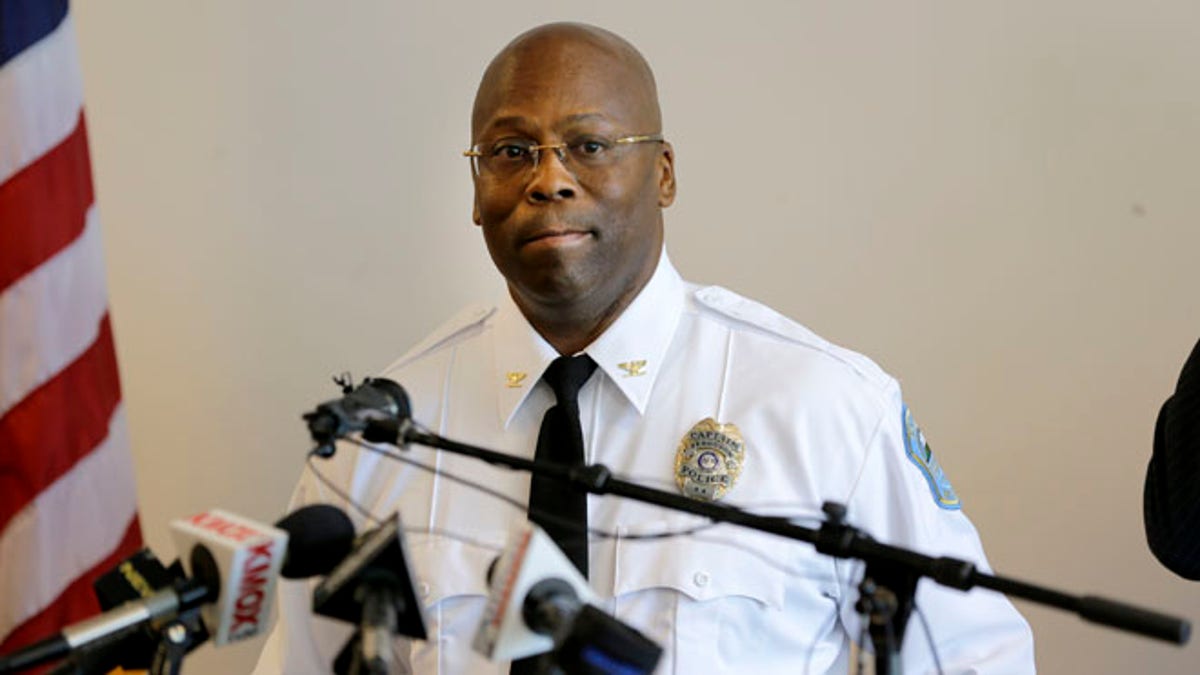
Andre Anderson speaks during a news conference announcing him as the interim police chief of the Ferguson Police Department. (AP)
The Ferguson police force has changed leadership again, with a third chief in four months.
The city on Wednesday introduced Andre Anderson, 50, as interim chief. Anderson previously was police commander in the Phoenix suburb of Glendale, Arizona — the same city from which Ferguson recently hired its interim city manager, Ed Beasley.
"There's a lot of work to be done. I'm ready to roll up my sleeves and get to work"
Anderson will take a six-month leave of absence from Glendale. His duties in Ferguson begin Thursday, and he made it clear he's interested in becoming the city's permanent chief.
"I'm hoping that I'm a candidate for the full-time position," Anderson said, but insisted his focus now is on building trust between police and the people of Ferguson.
Several top officials resigned in Ferguson after a scathing U.S. Department of Justice report in March, citing racial bias and profiling in policing as well as a profit-driven municipal court system that frequently targeted blacks. The Justice Department investigation was initiated after the fatal shooting on Aug. 9 of 18-year-old Michael Brown, who was black and unarmed, by a white Ferguson officer.
Following the report, Ferguson's municipal judge, city manager and Police Chief Tom Jackson resigned. Assistant chief Al Eickhoff was promoted to interim chief. With Anderson's arrival, Eickhoff will return to his role as assistant chief.
Anderson, like Beasley, is black. Eickhoff and Jackson, who was chief for five years, are white.
Anderson has more than 24 years of experience as a police officer. That includes overseeing Glendale's 80 detectives in the criminal investigation division and roughly 125 patrol officers, he said.
"I believe I am the right person for this particular job," Anderson said.
Among his priorities, Anderson said he wants to help attract and hire qualified applicants for police jobs, filling positions "that reflect the demographics of the community."
Ferguson is about two-thirds black but the vast majority of its police officers are white.
"There's a lot of work to be done. I'm ready to roll up my sleeves and get to work, and I appreciate this opportunity," Anderson said.
Beasley said Anderson is "exceptionally known nationally for his ability to lead and his innovation," referring to Anderson's expertise in community policing and outreach.
Eickhoff had joined the Ferguson police force just days before Brown was killed during a confrontation with officer Darren Wilson. The shooting touched off often-violent protests in Ferguson and a national "Black Lives Matter" movement seeking changes in how police deal with minorities.
A St. Louis County grand jury last November declined to indict Wilson, who later resigned. The Justice Department also declined to prosecute Wilson, announcing that decision at the same time it released the March report critical of police and court practices.
Mayor James Knowles III said Ferguson in recent months has adopted reforms, including hiring a new interim judge and revamping the municipal court system. He said Ferguson police were among the first in the St. Louis region to equip officers with body cameras in the wake of Brown's death.





















